
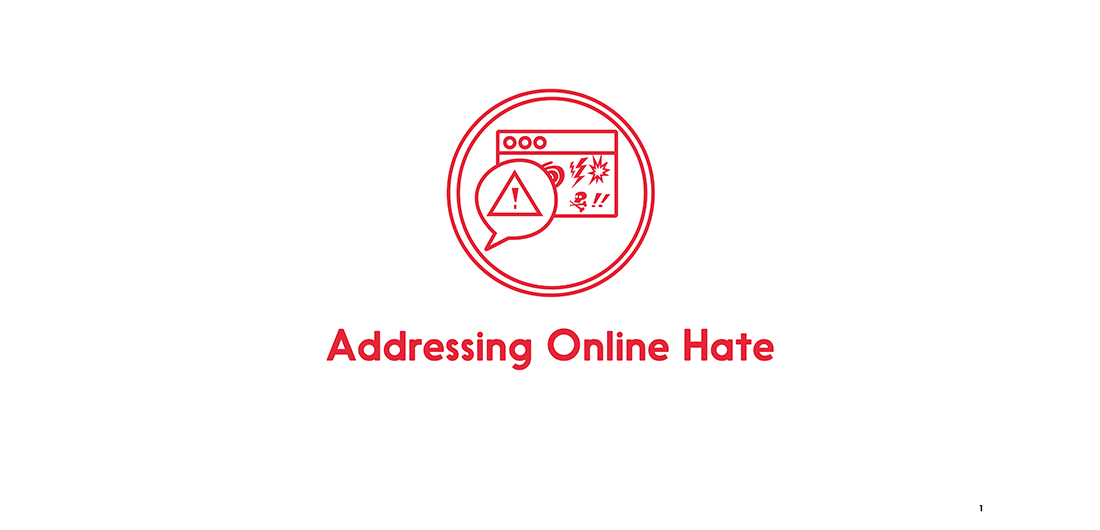 /
/Addressing Online Hate
This module was developed with our partner Project Someone. Project Someone works to build awareness, create spaces for pluralistic dialogues, and combat online hate. https://projectsomeone.ca
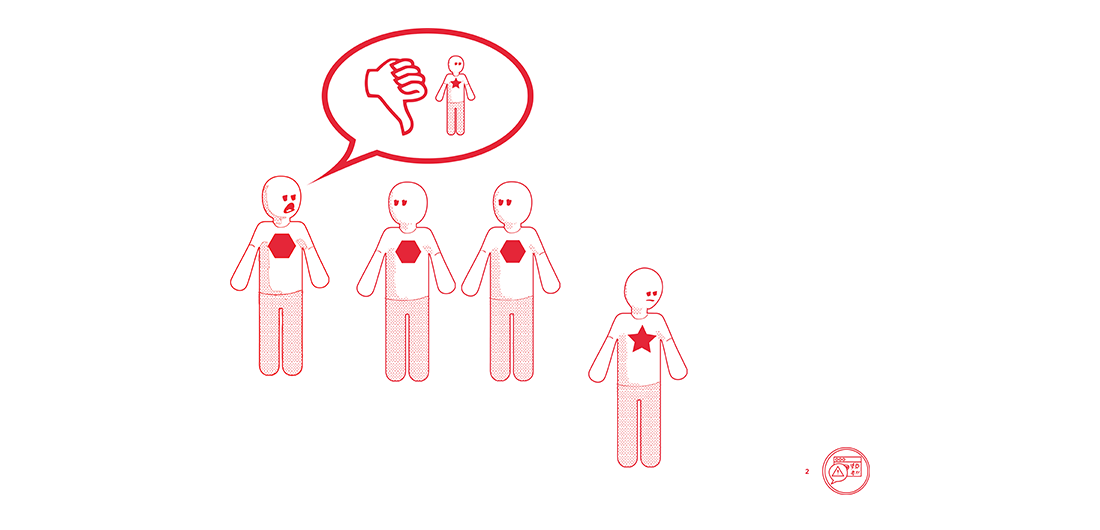 /
/Awareness of Forms of Hate
Messages that instill hate, promote hate or seek to exclude people based on their membership to a group are harmful and can be illegal. It is vital to be able to identify hate speech
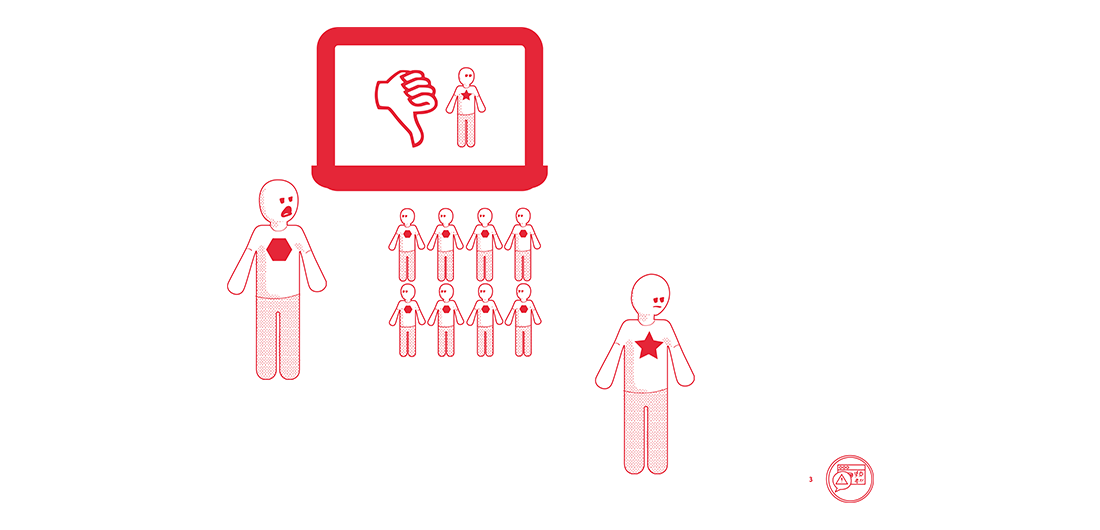 /
/How and Why Hate is disseminated Online
Social media may be used to propagate hatred, discrimination and, violence toward certain groups. It is important to understand how different online media tools are used to spread hate speech and discrimination.
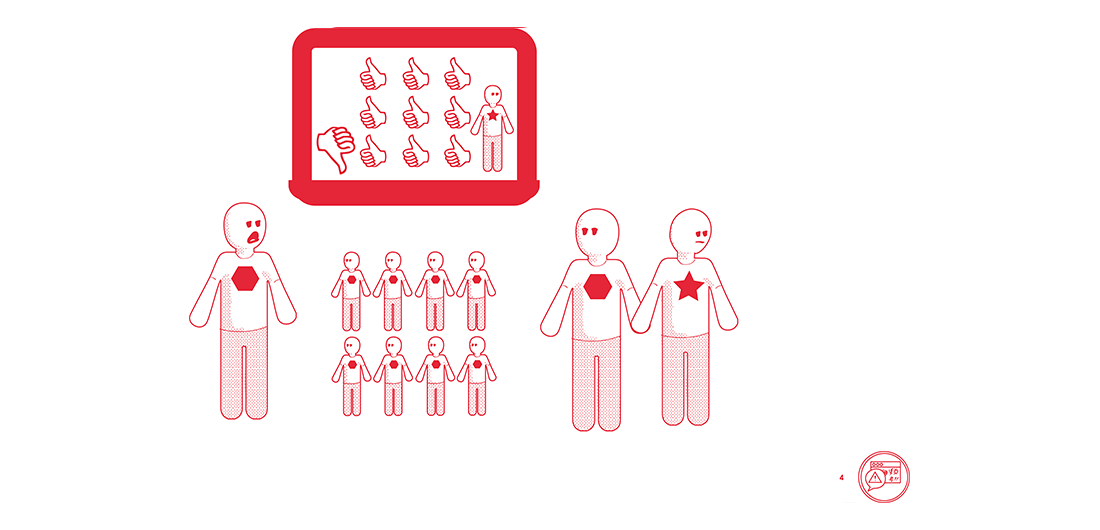 /
/Participating in non-discriminatory dialogue and being resilient online
It is important to think critically about the information found online, particularly in terms of how identifiable groups are represented, and to develop one’s sense of resilience and empathy in the context of online hate. Use these skills to find positive, tolerant sites and contribute to creating to non-discriminatory online spaces in which to participate
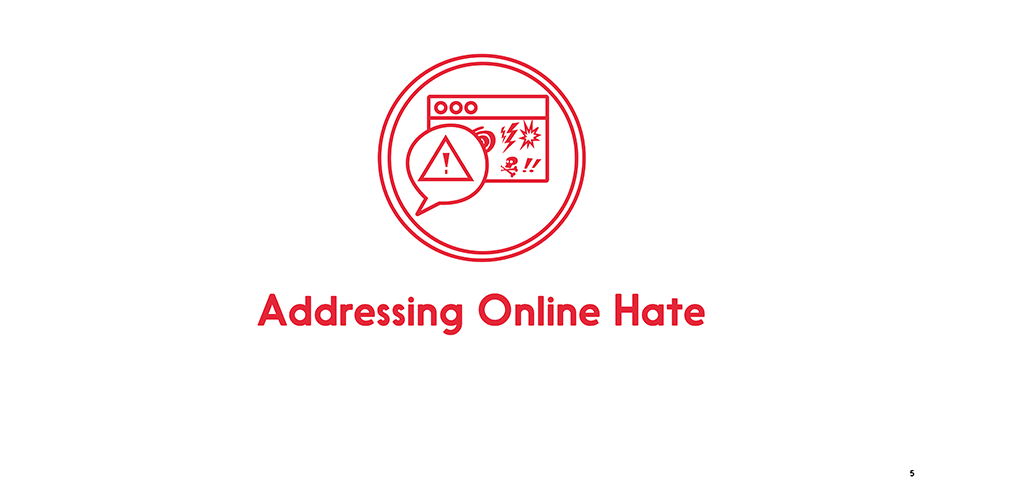 /
/Addressing Online Hate
-


Addressing Online Hate
Let’s see how much you learned about addressing online hate.
Test your knowledge and earn your badge to share
START THE QUIZ
 1/2
1/2Freedom from discrimination is a human right under:
The United Nations Universal Declaration of Human Rights
The Canadian Constitution
The Quebec Constitution
All of the above
next question
 1/2
1/2Hate Speech:
is any criticism about another person or people.
must be spoken, it doesn’t count if it is written.
is any communication that degrades or dehumanizes a group of people.
is something that was invented recently.
next question
 1/2
1/2Under the Criminal Code of Canada, a person guilty of the crime of hate speech is one who, by communicating statements:
incites hatred against any identifiable group
in any public place, incites hatred against any identifiable group where such incitement is likely to lead to a breach of the peace
in any place, incites hatred against any identifiable group where such incitement is likely to lead to a breach of the peace
in any place, incites hatred against any identifiable group where such incitement is likely to lead to a breach of the peace
next question
 1/2
1/2Hate speech is:
Always easy to identify
The opposite of free speech
a potential source of terror and have long term effects on minority groups
Just speech and can’t hurt anyone
next question
 1/2
1/2Hate speech online:
Is not such a problem because, it’s just the Internet
Only happens on the dark web
Is dangerous because of how fast and far it can spread
Only happens in YouTube comments
next question
 1/2
1/2Hate speech online:
Only happens on far-right propaganda websites
Only happens on far-left propaganda websites
Never happens on reputable news sites, even in the comments
Can happen anywhere on the Internet
next question
 1/2
1/2It is difficult to know which information to trust online because
Cheap tools make developing professional looking sites easy for propogandists
Fake followers can create the sense of a popular opinion without real people being involved.
Legitimate news organisations can be tricked to write stories containing propaganda
All of the above.
next question
 1/2
1/2Critical Thinking can start with asking yourself:
What arguments are being made?
What evidence is being provided?
Who is making the argument?
What are the perspectives and assumptions that are present in this article?
What perspective is missing?
All of the Above
next question
 1/2
1/2Empathy is an important tool for creating non-discriminatory spaces. Empathy:
Is a capacity to understand and respond to the unique affective experiences of another person
Is a super human ability similar to telepathy
Provides the ability to see past prejudice and stereotypes to understand another person
d) Both a and c
next question
 1/2
1/2You could respond to hate speech by:
Making choices about what to believe and share yourself,
Educating those around you
Notifying social media companies and websites about hate speech
Notifying the police
All of the Above
next question
-

Addressing Online Hate
your results
/100Congratulations, you earned your badge!
Share on Facebook
Show the answers
Hide the answers
You are on the right track. Some points need to be clarified. Please review the module and try again.
Restart the quiz
1-Freedom from discrimination is a human right under:
The United Nations Universal Declaration of Human Rights
The Canadian Constitution
The Quebec Constitution
All of the above
Freedom from discrimination is a human right under the 1st and 2nd article of the United Nations Universal Declaration of Human Rights, the 2nd and 15th articles of the Canadian Constitution and the 3rd and 10th articles of the Quebec Constitution. It is important in a multi-cultural society that people do not feel discriminated against because of their diversity.
2-Hate Speech:
is any criticism about another person or people.
must be spoken, it doesn’t count if it is written.
is any communication that degrades or dehumanizes a group of people.
is something that was invented recently.
Hate speech is any communication that degrades or dehumanizes a group of people. It is not just criticism of others, but is about attempting to dehumanize an identifiable group of people. It is unfortunately not new, being a problem throughout history and with even Canadian Supreme Court cases going back as far as the 80’s.
3-Under the Criminal Code of Canada, a person guilty of the crime of hate speech is one who, by communicating statements:
incites hatred against any identifiable group
in any public place, incites hatred against any identifiable group where such incitement is likely to lead to a breach of the peace
in any place, incites hatred against any identifiable group where such incitement is likely to lead to a breach of the peace
in any place, incites hatred against any identifiable group where such incitement is likely to lead to a breach of the peace
Under the Criminal Code a person who by communicating statements in any public place, incites hatred against any group where such incitement is likely to lead to a breach of the peace. There are exceptions, such as communications that are true, satirical or a religious opinion. The law is quite restricted to provide the greatest freedom of expression.
4-Hate speech is:
Always easy to identify
The opposite of free speech
a potential source of terror and have long term effects on minority groups
Just speech and can’t hurt anyone
Hate speech can have long term detrimental effects on the targeted group. It can also be a source of terror for minorities.
5-Hate speech online:
Is not such a problem because, it’s just the Internet
Only happens on the dark web
Is dangerous because of how fast and far it can spread
Only happens in YouTube comments
Hate Speech online can spread very fast and can reach around the globe in minutes or hours.
6-Hate speech online:
Only happens on far-right propaganda websites
Only happens on far-left propaganda websites
Never happens on reputable news sites, even in the comments
Can happen anywhere on the Internet
Hate speech is speech that degrades, dehumanises and promotes hate against a group. It can happen anywhere on the Internet.
7-It is difficult to know which information to trust online because
Cheap tools make developing professional looking sites easy for propogandists
Fake followers can create the sense of a popular opinion without real people being involved.
Legitimate news organisations can be tricked to write stories containing propaganda
All of the above.
It is difficult to know which information to trust in news reports, papers and online. We use critical thinking to consider carefully which information is more reliable before forming an opinion.
8-Critical Thinking can start with asking yourself:
What arguments are being made?
What evidence is being provided?
Who is making the argument?
What are the perspectives and assumptions that are present in this article?
What perspective is missing?
All of the Above
Critical thinking is thinking carefully about the piece and considering the arguments and evidence in the context of the real world.
9-Empathy is an important tool for creating non-discriminatory spaces. Empathy:
Is a capacity to understand and respond to the unique affective experiences of another person
Is a super human ability similar to telepathy
Provides the ability to see past prejudice and stereotypes to understand another person
d) Both a and c
Empathy is an important tool that can help us to better understand people to see past the prejudices and stereotypes we may have learned.
10-You could respond to hate speech by:
Making choices about what to believe and share yourself,
Educating those around you
Notifying social media companies and websites about hate speech
Notifying the police
All of the Above
All of these options are available to you to help combat hate speech. It is important that we take what action we can to preserve the right to be treated equally for all.
Cheat Sheet
Awareness of Forms of Hate
Messages that instill hate, promote hate or seek to exclude people based on their membership to a group are harmful and can be illegal. It is vital to be able to identify hate speech
DO recognize and identify different forms of marginalization against identifiable groups.
DO understand why it’s a problem, and the consequences
DO recognize and identify different forms of marginalization in closer communities and more globally
How and Why Hate is disseminated Online
Social media may be used to propagate hatred, discrimination and, violence toward certain groups. It is important to understand how different online media tools are used to spread hate speech and discrimination.
DO identify online hate speech
DO understand and explain how Social Media has augmented the extent of hatred and discrimination
DO be aware of the different forms of Social Media involved in this form of online hate.
Participating in non-discriminatory dialogue and being resilient online
It is important to think critically about the information found online, particularly in terms of how identifiable groups are represented, and to develop one’s sense of resilience and empathy in the context of online hate. Use these skills to find positive, tolerant sites and contribute to creating to non-discriminatory online spaces in which to participate.
DO know your rights as an individual and the rights of others
DO actively question the credibility of what you read and watch online
DO have offline conversations about online behaviour
Glossary of Terms
Anti-Semitism
A discriminatory perception or hatred toward Jewish people.
Astroturfing
Automated virtual personas on Social Media created to give the impression of a social movement.
Digital citizenship
The norms of appropriate, responsible technology use.
Discrimination
Unfair treatment of a person or group based on an opinion formed before having the relevant facts.
Empathy
Experiencing an understanding of another person’s condition from their perspective; walking a mile in their shoes.
Gender
A culturally specific set of characteristics that relate to the social behaviour and relationships of men and women.
Hate
Extreme dislike or intense hostility usually out of fear, anger, or feeling injured.
Hate speech
Messages that instill hate, promote hate or seek to exclude people based on their group.
Homophobia
A fear or dislike of all or most Homosexuals.
Islamophobia
A fear or dislike of all or most Muslims.
Propaganda
Information used to promote or publicize an ideology or point of view that is often biased or misleading.
Racism/ Racial discrimination
Any distinction, exclusion, restriction or preference based on race, colour, descent, or national or ethnic origin, which has the purpose or effect of impairing the recognition, or equal enjoyment of human rights and freedoms.
Resilience
Having the skills and resources necessary to fare well in the face of adversity.
Social Media
A service designed to provide tools for socializing with others across the Internet.
Resources
Download SERENE-RISC printable material
Trainers
Trainer Resource -Addressing Online Hate (PDF)
Lesson Plan – Addressing Online Hate (PDF)
Handout Sheet Answer Key – Addressing Online Hate (PDF)
Resource Sheet-Addressing Online Hate (PDF)
Students
Cheat Sheet – Addressing Online Hate (PDF)
Hand Out Sheet – Addressing Online Hate (PDF)
Additional resources
External Links
Project Someone
Multimedia materials, training curricula and programs aim to prevent hate speech and build resilience towards radicalization that leads to violent extremism.
Reporting
Blogger
Reporting: https://support.google.com/blogger/answer/82111?hl=en
Google+
Reporting and information: https://support.google.com/plus/answer/6320425?co=GENIE.Platform%3DDesktop&hl=en
Twitter
Information: https://help.twitter.com/en/safety-and-security/report-abusive-behavior
Reporting page: https://help.twitter.com/forms/abusiveuser
YouTube
Information https://support.google.com/youtube/answer/2801939?hl=en
Facebook
Information: https://www.facebook.com/help/212722115425932
Facebook community Standards: https://www.facebook.com/communitystandards
Linkedin
Information: https://www.linkedin.com/help/linkedin/answer/37822
Instagram
Information: https://help.instagram.com/443165679053819
GoDaddy.com (Site Hosting Service)
Reporting Tool: https://supportcenter.godaddy.com/abusereport
Microsoft (Hate speech on their platforms)
Reporting tool: https://www.microsoft.com/en-ca/concern/hatespeech
NoHate Speech Movement (EU)
Reporting tool: https://www.nohatespeechmovement.org/hate-speech-watch/report/submit
Reporting to the Police in Canada:
British Colombia:
http://hatecrimebc.ca/contact/
Vancouver Police:
Québec
SPVM – https://www.spvm.qc.ca/en/Pages/Report-an-event/Hate-crimes-and-hate-incidents
Sûreté du Québec : General Crime Reporting tool: https://www.sq.gouv.qc.ca/en/contact-us/
Ontario
Ottawa Police – https://www.ottawapolice.ca/en/about-us/Hate-Crime-Unit.asp
Toronto Police – http://www.torontopolice.on.ca/crimeprevention/hatecrime.php
Alberta
Edmonton Police – http://www.edmontonpolice.ca/CommunityPolicing/OrganizedCrime/HateBiasCrime.aspx
Calgary Police
Saskatchewan
Regina Police:
http://reginapolice.ca/online-reporting/
Saskatoon Police:
https://saskatoonpolice.ca/onlinereporting/faq
New Brunswick
Fredericton Police:
http://www.fredericton.ca/en/fredericton-police/online-crime-reporting
Winnipeg Police:
http://www.winnipeg.ca/police/coplogic/faqs.stm
Nova Scotia
Halifax Police:
https://www.halifax.ca/fire-police/police/reporting-crime/online-crime-reporting
Other Links:
http://www.albertahatecrimes.org